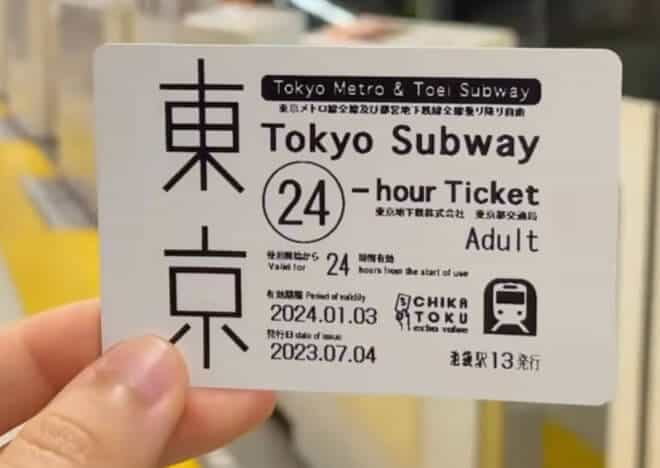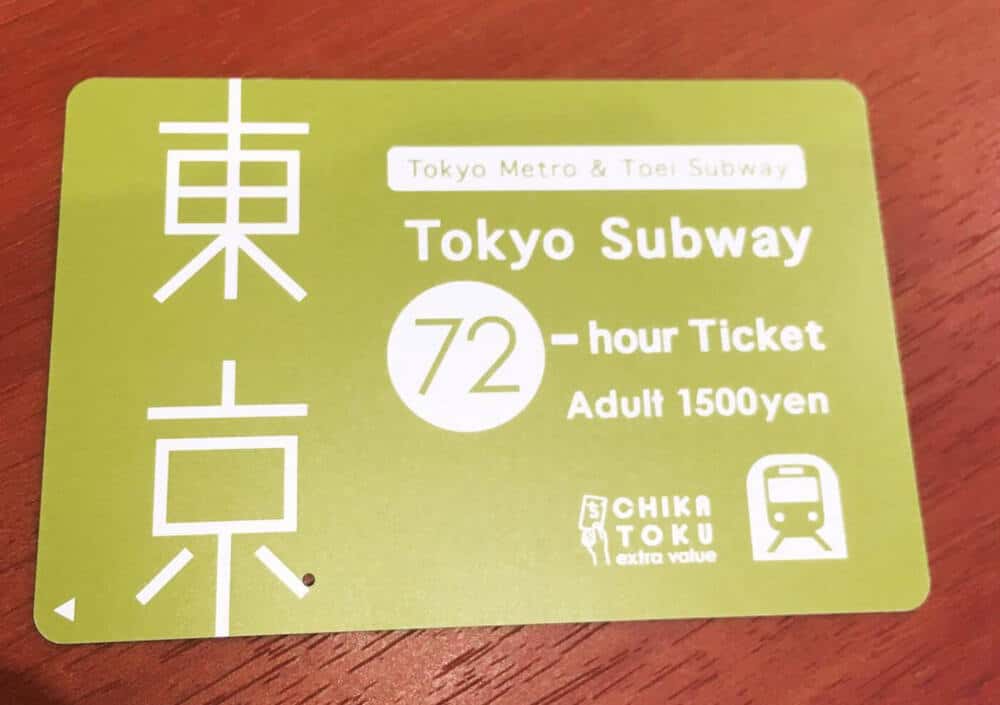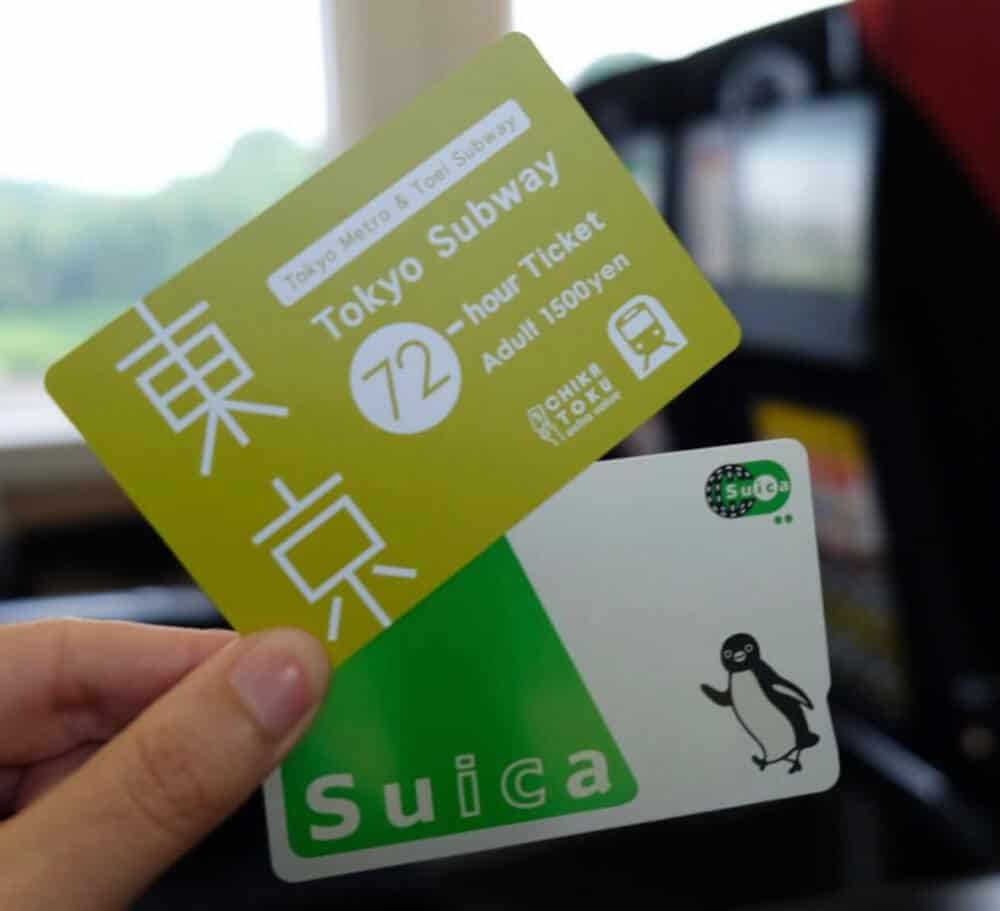Is Tokyo Metro Pass Worth It? If you’re a tourist in Tokyo and visiting for a few days then Tokyo metro pass is an affordable way to get around the city of Tokyo.
Planning an adventure to Tokyo? Navigating the intricate web of Tokyo's public transportation system doesn't have to be a daunting task.
Enter the Tokyo Subway Pass, a travel essential that can streamline your journey and save you both time and money.
In this comprehensive guide, we delve into the ins and outs of the Tokyo Subway Pass to help you make an informed decision for your Tokyo exploration.
Discover how this pass can open doors to convenience and unlock significant savings as you traverse this dynamic metropolis.
Is Tokyo Metro Pass Worth It?
The Tokyo Metro Pass can be a worthwhile investment for travelers exploring Tokyo. It offers unlimited travel on Tokyo Metro and Toei Subway lines, providing convenience and cost savings, especially if you plan to use the subway extensively.

The pass is available in 24-hour, 48-hour, and 72-hour variants, catering to various trip durations.
It simplifies fare calculations and bypasses language barriers, making your Tokyo adventure more accessible.
However, it may not be the best choice for those with limited subway use or short stays. To determine its worth, consider your itinerary, duration, and transportation needs for a seamless Tokyo experience.
What is the Tokyo Metro Pass Or Tokyo Subway Ticket?
The Tokyo Metro Pass, also known as the Tokyo Subway Ticket, is a prepaid card that allows unlimited travel on Tokyo's subway system for a fixed duration, typically available in 24-hour, 48-hour, and 72-hour variants.
The Tokyo subway network is a lifeline of the city, connecting major tourist attractions, shopping districts, and residential areas.
It's operated by two companies: Tokyo Metro and Toei Subway. The pass covers both, making it a versatile choice for travelers.
- Related:
Advantages of the Tokyo Subway Ticket
- Cost Savings
One of the most significant advantages of the Tokyo Metro Pass is its potential to save you money. Tokyo is a sprawling city with numerous must-visit sites, and transportation costs can add up quickly.
With the pass, you can travel unlimitedly within the designated timeframe for a fixed fee, which is often less expensive than purchasing individual tickets for each journey.
- Convenience
The Tokyo Metro Pass offers a hassle-free way to explore the city. You won't have to worry about calculating fares or standing in line at ticket machines for every ride.
This convenience can be a time-saver and reduce the stress of navigating Tokyo's extensive subway system, especially if you're not proficient in Japanese.
- Flexibility
Whether you're in Tokyo for a day, two days, or three, the pass provides flexibility to explore at your own pace. You can hop on and off the subway as many times as you want during the pass's validity period.
This flexibility is particularly appealing for travelers who want to see various parts of Tokyo in a short amount of time.
- Coverage
The Tokyo Metro Pass covers a vast network, including both Tokyo Metro and Toei Subway lines. This means you can access popular destinations like Shinjuku, Shibuya, Akihabara, and Asakusa without any extra cost.
It's especially advantageous for tourists because these areas are home to numerous attractions, shopping districts, and restaurants.
- Reduced Language Barrier
Navigating public transportation in a foreign country can be challenging, especially if you don't speak the local language.
With the Tokyo Metro Pass, you can bypass the need to interact with ticket machines or station attendants, making your travel experience more accessible and less dependent on language skills.
When the Tokyo Metro Pass May Not Be Worth It
While the Tokyo Metro Pass offers numerous benefits, it may not be the best choice for every traveler. Here are some scenarios in which it might not be worth the investment:
- Limited Stay
If your stay in Tokyo is brief, say less than 24 hours, it may be more cost-effective to purchase single tickets as you go. The pass's value is maximized when you intend to use it extensively during its validity period.
- Regional Passes
If you plan to explore other regions of Japan outside of Tokyo, you might consider regional passes that cover both local transportation and Shinkansen (bullet train) journeys. These passes can offer better value if you're traveling between cities.
- Walking Enthusiasts
Tokyo is a walkable city, and many attractions are clustered together in various neighborhoods. If you enjoy walking and don't plan to use the subway extensively, you may not need the Tokyo Metro Pass.
- Convenience vs. Savings
Some travelers prioritize convenience over savings. If you value the simplicity of having a prepaid card that covers all your subway travel, even if it might not result in the maximum cost savings, then the Tokyo Metro Pass is still a good choice for you.
How to Decide If Tokyo Subway Ticket Is Worth It For You?
To determine whether the Tokyo Metro Pass is worth it for your trip, consider the following:
- Itinerary: Map out your travel plans and estimate how often you'll be using the subway. The more frequently you use it, the more cost-effective the pass becomes.
- Duration: Decide how long you'll be staying in Tokyo. If your stay is relatively short, calculate whether the pass will save you money compared to individual tickets.
- Destinations: Identify the key attractions you plan to visit and check if they are easily accessible by subway. If many of them are, the pass becomes more appealing.
- Budget: Consider your overall budget for the trip. While the pass offers convenience and potential savings, it's essential to ensure it aligns with your financial plans.
- Flexibility: Assess how important flexibility is to your travel style. If you want the freedom to explore without constantly worrying about fares, the pass is a strong contender.
- Language Skills: If you're concerned about language barriers and prefer a simplified ticketing process, the Tokyo Metro Pass is a valuable tool.
Is 72 hour Tokyo pass worth it?

Whether the 72-hour Tokyo Metro Pass is worth it for you depends on your travel plans, the attractions you want to visit, and your transportation needs.
Here are some factors to consider when deciding if the 72-hour pass is a good choice for your trip:
- Duration of Stay: The 72-hour pass is ideal for travelers planning an extended visit to Tokyo. If you intend to stay in the city for three days or more and will be using the subway frequently during that time, this pass could offer substantial cost savings compared to buying individual tickets for each journey.
- Frequency of Subway Use: Consider how often you'll be using the Tokyo Metro during your stay. If you plan to explore various parts of the city, visit multiple attractions, or frequently move around, the 72-hour pass becomes more valuable as it provides unlimited rides within the validity period.
- Key Attractions: Check whether the major attractions you want to visit are easily accessible by the Tokyo Metro. If many of them are, the pass can be a cost-effective choice. Popular destinations like Shinjuku, Shibuya, Akihabara, Asakusa, and Ueno are well-connected by the subway.
- Convenience: The pass offers the convenience of not having to buy individual tickets for each subway ride. It can also save you time at ticket machines and reduce the stress of navigating the subway system. If convenience is a priority for you, the 72-hour pass is a valuable option.
- Flexibility: The pass provides flexibility to explore Tokyo at your own pace without worrying about transportation costs. If you want the freedom to hop on and off the subway whenever you like, the 72-hour pass offers that flexibility.
- Cost Comparison: Calculate the total cost of individual subway fares for your planned trips within a 72-hour period. Compare this cost to the price of the pass. If the pass is equal to or cheaper than the sum of individual tickets, it's likely worth it.
- Other Transportation Needs: Consider whether you plan to use other forms of transportation, such as buses, trams, or JR lines, during your stay. If you need to use multiple modes of transport, you might want to combine the Tokyo Metro Pass with other transportation passes for maximum savings.
In general, the 72-hour Tokyo Metro Pass is a good value if you plan to make full use of it by exploring the city extensively and visiting attractions that are well-connected by the subway.
However, if your stay in Tokyo is shorter, or you don't anticipate using the subway frequently, you may find that purchasing individual tickets is a more cost-effective option.
It's essential to tailor your choice to your specific travel plans and preferences to get the best value out of your Tokyo transportation experience.
Does Tokyo subway pass include monorail?
The standard Tokyo Metro Pass, which covers the Tokyo Metro and Toei Subway lines, does not include the Tokyo Monorail.
The Tokyo Monorail is a separate transportation system that connects Tokyo's city center to Haneda Airport.
If you plan to use both the Tokyo Metro and the Tokyo Monorail during your stay in Tokyo, you may need to purchase separate tickets or consider other transportation passes that include both systems. Some options include:
- Suica or Pasmo Card: These are rechargeable IC cards that can be used on various transportation systems in Tokyo, including the Tokyo Metro, Toei Subway, and the Tokyo Monorail. You can load credit onto the card and use it for easy fare payment on multiple modes of transit.
- Tokyo One-Day Open Ticket: This ticket provides unlimited rides on the Tokyo Metro, Toei Subway, and the Tokyo Monorail for one day. It can be a convenient choice if you plan to visit Haneda Airport during your stay.
- JR Pass with Monorail Access: If you have a Japan Rail Pass (JR Pass), you can use it to access the Tokyo Monorail to and from Haneda Airport. However, the JR Pass is typically most cost-effective for travelers who plan to explore multiple regions of Japan and use the Shinkansen (bullet trains).
When planning your transportation in Tokyo, consider your specific needs and itinerary to determine the most cost-effective option for your travels, especially if you'll be using both the subway and the monorail during your stay.
Is Metro cheap in Tokyo?
Tokyo's metro system is generally considered to be reasonably priced, especially when compared to transportation costs in many other major cities around the world.
However, what you consider "cheap" can depend on your perspective and the frequency of your subway use.
Here are some key points to consider about the cost of the Tokyo Metro:
- Fare Structure: Tokyo's subway system has a distance-based fare structure. The farther you travel, the more you pay. Fares typically start at around 170-200 yen for short distances and can go up from there. Some lines are more expensive than others, so costs can vary depending on your route.
- IC Cards: To make travel more convenient, many travelers in Tokyo use IC cards like Suica or Pasmo. These cards allow you to load credit onto them and use them for fare payment on the subway, buses, and even some convenience stores. They also offer discounts on some journeys and are more flexible than buying individual tickets.
- Unlimited Passes: Tokyo offers various unlimited ride passes, such as the Tokyo Metro Pass and the Tokyo Subway 24-Hour Ticket. These passes can provide excellent value if you plan to use the subway extensively during your stay. They allow unlimited travel within a specified time frame, which can result in cost savings.
- Comparative Costs: Compared to taxi fares or private transportation options, the Tokyo Metro is generally more cost-effective for getting around the city, especially during rush hours when traffic congestion can be significant.
- Child and Student Discounts: Tokyo Metro offers reduced fares for children and students, making it a more budget-friendly option for families and students.
- Off-Peak Discounts: Some lines offer reduced fares during off-peak hours. If you can adjust your travel times, you may save money.
Where to buy tokyo subway pass?
You can purchase the Tokyo Metro Pass, also known as the Tokyo Subway Ticket, at various locations in Tokyo, including airports, major train stations, and some travel agencies. Here are some common places where you can buy the pass:
Airports:
- Narita International Airport (NRT): You can purchase the Tokyo Subway Ticket at the Narita Airport Terminals 1 and 2 at the Keisei Bus Ticket Counter, JR East Travel Service Centers, and some other locations.
- Haneda International Airport (HND): You can buy the pass at the Tokyo Monorail Ticket Counter and the Keikyu Tourist Information Center at Haneda Airport.
Major Train Stations:
You can typically find Tokyo Subway Tickets at major train stations in Tokyo, such as Tokyo Station, Shinjuku Station, Ueno Station, and Shibuya Station. Look for the counters or kiosks that sell transportation passes or tickets.
Travel Agencies
Some travel agencies in Tokyo also sell the Tokyo Subway Ticket. You can check with them for availability and pricing.
Online Purchase
In some cases, you may be able to purchase the Tokyo Subway Ticket online through official websites or authorized resellers.
However, availability and terms may vary, so it's advisable to check the official Tokyo Metro website or contact them for information on online purchasing options.
When purchasing the Tokyo Subway Ticket, be sure to check the validity period and terms and conditions associated with the pass.
The pass is available in 24-hour, 48-hour, and 72-hour variants, so choose the one that best suits your travel plans.
Additionally, you can find detailed information on the official Tokyo Metro website, including the most up-to-date information on where to buy the pass and its current pricing.
Is Tokyo subway pass better or IC Card?
Whether the Tokyo Subway Pass or an IC card (such as Suica or Pasmo) is better for you depends on your specific travel plans and preferences.

Here's a comparison to help you decide which option is more suitable:
Tokyo Subway Pass:
- Unlimited Rides: The Tokyo Subway Pass offers unlimited rides on Tokyo Metro and Toei Subway lines within a specified time frame (e.g., 24 hours, 48 hours, or 72 hours). This can be a cost-effective option if you plan to use the subway extensively during your stay.
- Convenience: It's a convenient option for tourists because you don't need to calculate fares for each trip. You simply show your pass at the gate, and you're good to go.
- Cost Savings: If you intend to use the subway frequently, the pass can provide significant savings compared to purchasing individual tickets for each journey.
IC Card (Suica, Pasmo, etc.):
- Flexibility: IC cards offer flexibility as they can be used on various forms of public transportation in Tokyo, including subways, buses, and even some regional trains. You can also use them for small purchases at convenience stores and vending machines.
- Reloadable: IC cards can be recharged with credit as needed, so you can top them up whenever you run low on funds. This makes them a versatile option for both short and long stays in Tokyo.
- No Time Limit: IC cards don't have a specific time frame for use, unlike the Tokyo Subway Pass. They remain valid as long as there is credit on the card.
- Child and Student Cards: Special versions of IC cards are available for children and students, offering discounts on fares.
Considerations:
- If you plan to stay in Tokyo for an extended period and will use the subway frequently, the Tokyo Subway Pass might offer better value.
- IC cards are convenient for travelers who want a single card for various modes of transportation and don't want to worry about purchasing individual tickets.
- IC cards are generally more flexible for those with uncertain travel plans, as you can load them with credit as needed.
- If you plan to use the subway infrequently or for a short stay, individual tickets may also be a viable and straightforward option.
Ultimately, the choice between the Tokyo Subway Pass and an IC card depends on your travel style and the specifics of your trip. You might even consider using a combination of both if it suits your needs.
How expensive is the Metro in Tokyo?
The price of the Metro in Tokyo depends on the distance you travel. The fare for a single journey ranges from 170 to 320 yen.
There are also day passes available, which offer unlimited rides on the Metro for a set period of time. The price of a day pass is 600 yen for adults and 300 yen for children.
Here is a table of the Metro fares in Tokyo:
| Distance | Fare (Adult) | Fare (Child) |
| 170 yen section | 170 yen | 85 yen |
| 210 yen section | 210 yen | 105 yen |
| 260 yen section | 260 yen | 130 yen |
| 300 yen section | 300 yen | 150 yen |
| 330 yen section | 330 yen | 165 yen |
If you are planning to use the Metro extensively during your stay in Tokyo, it is worth purchasing a day pass. This will save you money if you are traveling long distances or making multiple trips.
Also Read




